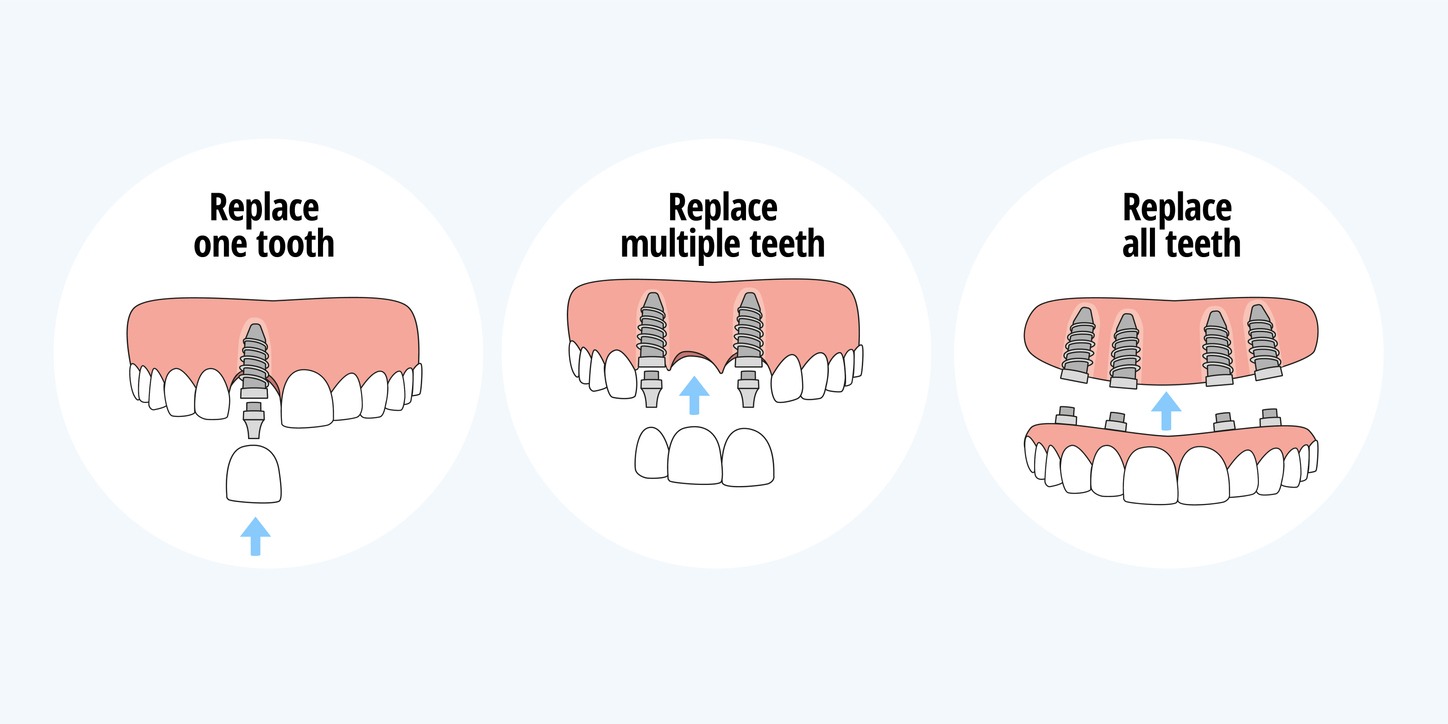Dental implants have revolutionized the field of restorative dentistry, providing a reliable and durable solution for individuals with missing teeth. They can literally transform a person’s smile! While the success rate of dental implants is generally high, it’s essential to acknowledge that, like any medical procedure, complications can arise. Here we will explore benefits and potential issues and complications that may occur with dental implants.
Understanding the Benefits of Dental Implants
Dental implants offer a transformative solution for individuals facing the challenges of missing teeth. Here are several compelling reasons why someone might choose to get dental implants:
- Restored Functionality: Dental implants provide a stable and secure foundation for artificial teeth, restoring the ability to bite, chew, and speak with confidence. Unlike removable dentures, implants mimic the natural tooth structure, allowing for a more natural and efficient chewing process.
- Aesthetic Enhancement: Implants are designed to closely resemble natural teeth in terms of color, shape, and contour. This aesthetic integration ensures that the dental restoration blends seamlessly with the existing dentition, enhancing the overall appearance of the smile.
- Preservation of Jawbone Health: When a tooth is lost, the jawbone in that area may start to deteriorate due to lack of stimulation. Dental implants mimic the natural tooth root, providing essential stimulation to the jawbone during activities like chewing. This helps prevent bone resorption and maintains the integrity of the jaw structure.
- Long-Term Durability: Dental implants are known for their durability and longevity. With proper care and maintenance, implants can last for many years, often surpassing the lifespan of other tooth replacement options.
- Improved Speech: Missing teeth, especially in the front of the mouth, can affect speech clarity. Dental implants restore the natural alignment of teeth, improving speech and articulation.
- No Impact on Adjacent Teeth: Unlike traditional bridges, dental implants do not require the alteration or preparation of adjacent natural teeth for support. This preservation of healthy tooth structure contributes to long-term oral health.
- Enhanced Comfort: Implants eliminate the discomfort and potential irritation associated with removable dentures. They become a permanent part of the oral structure, offering stability and comfort in daily activities.
- Increased Confidence: Dental implants provide a stable and reliable solution for tooth replacement, boosting confidence in social interactions and self-esteem. Patients no longer need to worry about the instability or embarrassment often associated with removable dentures.
- Versatility in Treatment Options: Dental implants can be used to support various restorations, from single crowns to bridges and full arch dentures. This versatility makes them applicable in a wide range of clinical scenarios, catering to individual patient needs.
- Biocompatibility: Dental implants are typically made from biocompatible materials such as titanium. This ensures that the implant integrates well with the surrounding tissues, minimizing the risk of allergic reactions or rejection.
- Convenience and Ease of Maintenance: Implants eliminate the need for special cleaning routines or adhesives associated with removable dentures. Regular oral hygiene practices, such as brushing and flossing, suffice to maintain the health of dental implants.
- Prevention of Shifting Teeth: When a tooth is lost, adjacent teeth may start to shift into the empty space, leading to misalignment. Dental implants prevent this shifting by filling the gap and maintaining the proper alignment of teeth.
Those are the many benefits that Dental Implants can provide and can have a large impact on quality of life, self assuredness, and much more.
Understanding Potential Complications with Dental Implants
While dental implants have revolutionized tooth replacement and brought about significant improvements in oral health and quality of life, it’s crucial to acknowledge the potential complications that can arise.
- Osseointegration Challenges: Osseointegration, the process where the implant fuses with the jawbone, is crucial for the long-term success of dental implants. However, factors such as poor bone quality, insufficient bone volume, or certain medical conditions can impede this process. Insufficient osseointegration may lead to implant failure or complications such as implant mobility.
- Infection and Peri-Implantitis: Infections around dental implants, known as peri-implantitis, can pose a significant threat. Poor oral hygiene, smoking, and pre-existing periodontal conditions are risk factors. If left untreated, peri-implantitis can result in bone loss around the implant, potentially leading to implant failure.
- Implant Failure: While dental implants are designed for durability, various factors can contribute to implant failure. These include issues during the surgical placement, inadequate osseointegration, or complications that arise after the placement, such as infections or mechanical problems.
- Nerve and Tissue Damage: Improper implant placement or anatomical variations may lead to damage to surrounding nerves or tissues. Numbness, tingling, or pain in the surrounding areas may occur if nerves are affected. Careful treatment planning and precise surgical techniques can minimize this risk.
- Allergic Reactions: While rare, allergic reactions to implant materials can occur. Titanium, commonly used in implants, is generally well-tolerated, but some individuals may develop hypersensitivity. Thorough patient screening and discussing potential allergies are essential before implant placement.
- Overloading and Mechanical Complications: Placing excessive force on dental implants, especially during the healing period, can result in overloading. This may cause mechanical complications, including implant fracture or screw loosening. Following post-operative care instructions and avoiding undue stress on implants are crucial in preventing such issues.
- Implant Protrusion and Esthetic Concerns: Poorly planned or executed implant placement may lead to the implant protruding through the gum tissue, causing esthetic concerns. This can impact the overall appearance of the smile and may require corrective procedures.
- Poor Prosthetic Fit: Issues with the prosthetic components, such as crowns or bridges, can occur. Poorly fitting restorations may contribute to complications like inflammation, discomfort, or difficulty chewing. Regular follow-ups and adjustments are vital to address any prosthetic-related issues.
- Sinus Issues with Upper Jaw Implants: Implants in the upper jaw, particularly in the posterior region, may extend into the sinus cavity. Sinus infections or sinusitis can occur if there is communication between the implant site and the sinus. Careful treatment planning and coordination with an experienced implantologist help prevent such complications.
- Bruxism-Related Complications: Individuals who grind or clench their teeth (bruxism) may experience complications with dental implants. The excessive force exerted during bruxism can lead to implant overload, screw loosening, or even implant fracture. Using a nightguard and addressing bruxism are essential preventive measures.
Conclusion
The key to successful implant treatment lies in thorough treatment planning, precise surgical techniques, patient education, and diligent post-operative care. Regular follow-up appointments with the dental professional, adherence to oral hygiene practices, and addressing any concerns promptly contribute to the long-term success of dental implants. By being informed about potential complications and actively participating in the care process, individuals can navigate the journey of dental implants with confidence and achieve the full benefits of this transformative restorative solution.


